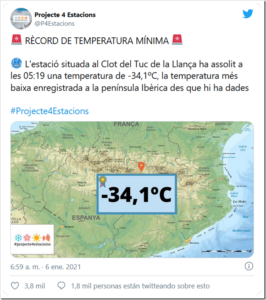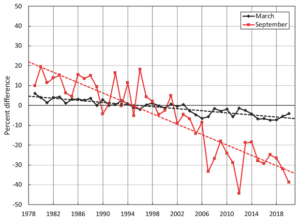by P. Homewood, Jan 6, 2021 in NotaLotofPeopleKnowThat
The storm ‘Filomena’ leaves the lowest temperature ever recorded in the Iberian Peninsula: –34.1C
Temperatures in Spain this winter are reaching maximum levels. This week has been very cold, with frosts in much of Spain even in areas very close to the coast. The early morning of this Wednesday was marked by intense cold and snowfall. The thermometers show such low figures that the temperature at the Clot de la Llança (Alto Aneu) weather station stands out: – 34.1 degrees.
It is the lowest temperature in the Iberian Peninsula since there are records. Information provided by the Parc Natural de l’Alt Pirineu (managed by Meteo Pirineo and Meteo Valls d’Àneu). And it has also been confirmed by AEMET. This temperature, 34.1 degrees below zero, is a record since the last time something similar was recorded was on February 2, 1956 with -32.0ºC in Estany-Gento, in the province of Lleida,
https://www.20minutos.es/noticia/4533488/0/borrasca-filomena-record-temperatura-minima-34-1-grados/

…
See also here
by C. Rotter, Jan 7, 2021 in WUWT
Alps ice-free…6000 years ago, when CO2 was much lower than today’s levels.
Dr. Sebastian Lüning earlier today released his latest Klimaschau report, No. 6. In the first part he looks at glaciers in the Alps over the course of much the Holocene.
See the video
It turns out that Most of the Alps were ice-free 6000 years ago, glaciologists have discovered.
In his video, the German geologist presents a new paper authored by glaciologists Bohleber et al, 2020 of the Austrian Academy of Science. The Austrian-Swiss team discovered from ice cores that the 3500-meter high Weißseespitze summit was ice free 5900 years ago.
Much warmer in the early Holocene
Lüning next shows why the Alps were ice-free 6000 years ago by using a chart by Heiri et al 2015, which shows it was some 2°C warmer than today.
…
by Polar Bear Science, Jan 8, 2021 in WUWT
As well as summarizing sea ice changes, NOAA’s 2020 Arctic Report Card features two reports that document the biggest advantage of much less summer sea ice than there was before 2003: increased primary productivity. Being at the top of the Arctic food chain, polar bears have been beneficiaries of this phenomenon because the Arctic marine mammals they depend on for food – seals, walrus and bowhead whales – have been thriving despite less ice in summer.

In the sea ice chapter (Perovich et al. 2020), my favourite of all the figures published is the graph of September vs. March sea ice (above). As you can see, March ice extent has been virtually flat (no declining trend) since 2004. And as the graph below shows, September extent has been without a trend since 2007, as NSIDC ice expert Walt Meier demonstrated last year (see below): it doesn’t take much imagination to see that the value for 2020 from the graph above (the second-lowest after 2012) hasn’t changed the flat-trend line.
…
by Cap Allon, Jan 7, 2021 in Electroverse
The mercury in China’s capital Beijing plunged to -19.6C (-3.3F) on Thursday morning, January 7 as the powerful Arctic air mass currently gripping the majority of Asia intensified further.
The reading marked the capital’s coldest temperature since 1966 (solar minimum of cycle 19), in record-books dating back to 1912.
Furthermore, 10 out the 20 national-level meteorological stations in Beijing registered their lowest-ever early-January temperatures Thursday morning.
Blue alerts remain in effect across much of China as record low temperature and heavy snow are forecast to linger, at least until the weekend.
The intense cold wave began in mid-December, and is the result of Arctic air spilling down over the Asian continent (see low solar activity and meridional jet stream). Many all-time cold records have fallen across China of late…
See also : LNG Prices hit Record Highs as Severe Cold Intensifies across Asia and Europe
La géologie, une science plus que passionnante … et diverse


